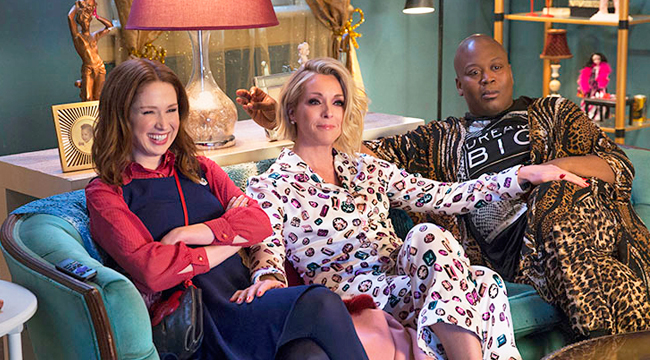
Netflix has dropped the first half of the fourth and final season of Unbreakable Kimmy Schmidt (although there may be a movie), and the titular heroine and pals couldn’t be more welcome in this current cultural climate. During these six episodes, the sunny and gloriously silly show sticks with a consistent vibe, so as not to disappoint any relief-seeking binge watchers. However, there’s a surprising amount of nuance in this season, and a few characters see unprecedented (and downright shocking) growth.
Essentially, the show has functioned as a delayed coming-of-age tale for some of these players. Even though Kimmy is the character who was trapped in a bunker for 15 years, so she’s the one expected to make significant strides (and she does), they’ve all been fairly sheltered and, therefore, stunted, until now. Let’s rank how well they embraced change this season.
5. Richard Wayne Gary Wayne
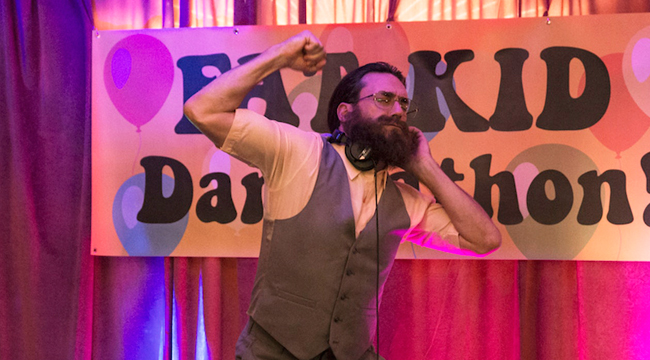
Let’s get real, the reverend who imprisoned Kimmy and three other women will never express remorse — he’s the textbook definition of a lost cause. Yet this entry exists not only to highlight that fact but also to drop praise upon Jon Hamm’s charismatic performance. His Richard Wayne Gary Wayne is such a fan favorite that they gave him his own mockumentary-style episode called “Party Monster: Scratching The Surface,” which expertly parodies Netflix’s own Making A Murderer.
In the documentary (which is viewed by an aghast Kimmy, who has finally discovered binge-watching after three seasons), aspiring DJ Fingablast attempts to paint the reverend as a misunderstood figure, who once reigned as DJ Slizzard. Naturally, Wayne cannot help but operate as the manipulator that he’ll always be, and he’s eventually exposed as such. Although he’ll remain in prison for some time to come, it’s oddly comforting to see the show check in with Wayne in a different (and delightfully rendered) setting.
4. Lillian Kaushtupper
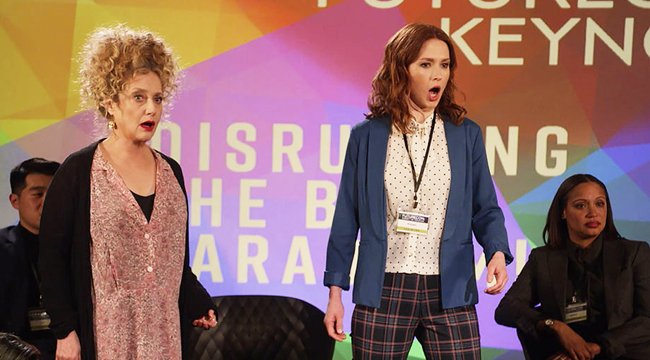
Landlord Lillian is given more to do during this season — which brings mixed results because a little Lillian goes a long way — than fret over gentrification of the neighborhood and how Titus is late on payments. She’s still eccentric as heck and embodied to perfect quirky effect by Carol Kane, even if she’s simply a codependent comedic figure with no real persona of her own. Lillian’s the endless tag-along pal, the strategic puller of fire alarms, and the one who spouts conspiracy theories while the other characters patiently endure.
In short, Lillian is unrepentant as hell and blissfully resistant to change, though she’s never nefarious while wreaking havoc. She harmlessly tells someone that she authored the Jack Reacher books, and yes, she forgets to tell the family of her last boyfriend that he died, but no real damage comes from any of her antics. However, Lillian becomes the trustee for the inheritance of Busy Phillips’ spoiled Sheba character, which could provide a nice set-up for future episodes, as the pair displays sweet antagonistic chemistry.
3. Titus Andromedon
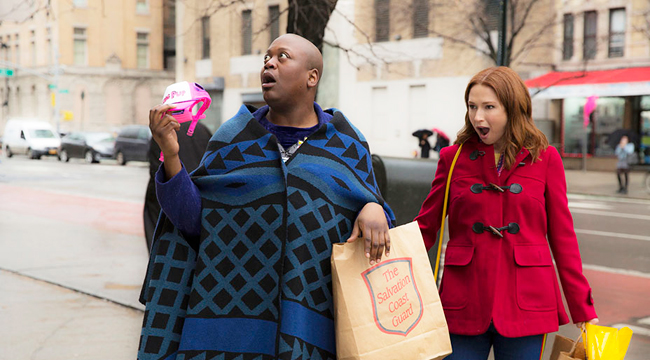
Kimmy’s roommate, played to high tenor perfection by Tituss Burgess, still gets the best dialogue of the show (“Kimothy Olyphant, this is not justified…”). Until now, he’s seen the concept of growth as beneath him and would prefer to remain his selfish self, but he undergoes substantial development through the course of these six episodes. Yes, he may have betrayed Kimmy by appearing in the DJ Slizzard doc, and he’s driving Jacqueline crazy by rejecting gigs that he views as undignified, but he reluctantly takes some big steps.
Of course, Titus is still catty as heck when he snags the job of directing a high school musical, and he aims to steal the spotlight to finally be the star of such a production, since he was pigeonholed into a jock role during his younger years. As such, he retaliates against his former teachers and coaches by sidelining a talented boy named Hudson to seize all of the glory for Titus.
“See? This is growth,” he claims with faux-innocent wide eyes. “I’m finally honoring my repressed theater nerd.”
Finally, his conscience gets the better of him and he relents (partially at the urging of Kimmy) in order to break the cycle, which fosters true growth for his character. And yes, Titus finally gets his due in an unselfish way by earning a directorial standing ovation and sobbing while receiving flowers.
2. Kimmy Schmidt

Kimmy’s season begins with promise after she falls into a new job as an HR head, but soon enough, those years that she spent in the bunker spark boundary issues once more. Kimmy inadvertently appears to hit on an employee while firing him, an episode that references the post-Weinstein awakening in corporate culture. Fortunately, she realizes the error of her approach and shapes up before moving on to other trainwreck-y moves.
Case in point: Kimmy tries to liberate a nail salon technician (who owes her employer $10,000 for transport to the U.S.) and, in the process, learns about her own white privilege from Titus. He tells her that simply because she suffered hardships — “I know what it’s like to be treated like dirt, I spent 15 years underground, that’s where dirt lives!” she shouts — that doesn’t mean she fully understands the plight of the disadvantaged. And when the nail tech accurately points out, “The important thing is that you feel good about it,” Kimmy sort-of understands that her efforts to “save” everyone are often performed for herself.
Then there’s the tear-jerking episode where Kimmy recovers her beloved old (anthropomorphized) backpack, which persuades her to write a children’s book that a publisher hates. Kimmy then decides to finally grow up and delivers a speech to her backpack:
“Grownups don’t just wake up one day and decide they’ll write a book that’s gonna fix everything … if I want to change the world, I’ve gotta start by changing myself.”
As Kimmy emotionally fills her backpack with rocks and prepares it for a watery grave, she gets the phone call that persuades her to change tactics and spare her JanSport friend. Yes, she learns that she can still possess her childlike spirit, remain herself, and grow at the same time.
1. Jacqueline White/Voorhees
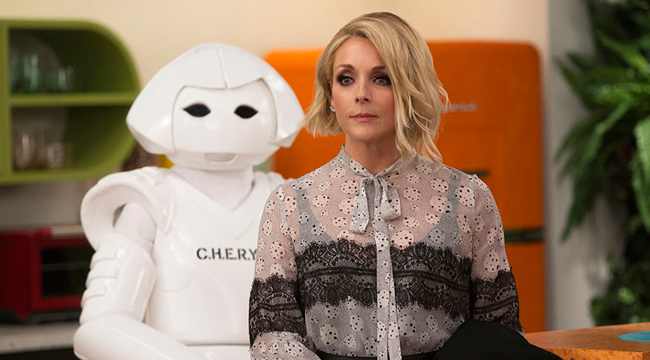
Jane Krakowski’s ability to turn on a dime from silly to serious couldn’t be more underrated, and playing Jacqueline allows her to portray an unexpectedly multi-dimensional character. She’s definitely the winner in this contest, and the writers have been playing the long game with her.
In Season 1, Jacqueline arrived as an honest-to-god trophy wife, who fled one unfaithful, miserable marriage only to strike out immediately in pursuit of her second ultra-rich husband. In Seasons 2 and 3, she did find that match in David Cross’ Russ Snyder, who appeared to be her truest partner, and together, they worked to right some wrongs committed against her (secret) Native American heritage. Unfortunately, Russ (newly embodied by Billy Magnussen when Cross’ version was “smooshed”) became a materialistic airhead, and then Jacqueline found the courage to leave him, too.
In Season 4, Jacqueline aims to never financially sponge off anyone again while launching her career as a talent agent. Although she’s still a mess and freeloads off Kimmy to a degree, Jacqueline and her newly chaotic hair do a hell of a job — and as a bonus, she actually displays maternal instincts when ex-stepdaughter Xanthippe supposedly turns up pregnant. Jacqueline’s genuine concern is palpable, and she becomes the first adult to truly be there for Xan, who is thrilled when her defender confronts Xan’s former trust-fund sex partner.
“If you hear a little voice telling you that you’re important because you can pee standing up and drive a car in Saudi Arabia,” Jacqueline huffily tells the young man while fully revealing her transformed persona. “Don’t believe it.”
Those infamous lyrics in the show’s theme song — “females are strong as hell” — couldn’t agree more.






